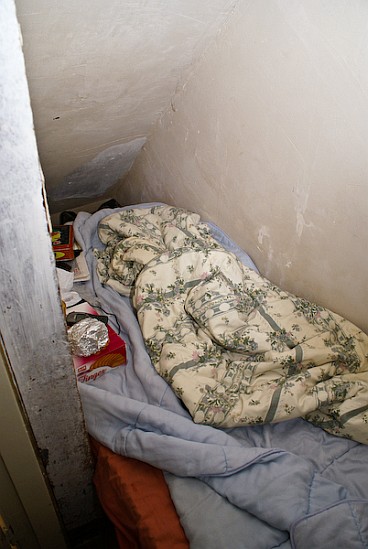Border restrictions may remain in place for Romanians and Bulgarians
Border restrictions may remain in place for Romanians and Bulgarians
The SP's arguments against the complete opening of the Netherlands' borders to workers from central and eastern Europe are finding increasing resonance, as the existence of a parliamentary majority opposed to such a move shows. The government wants to see all border restrictions removed by 1st January 2009. The SP is arguing instead for a system of work permits, by means of which, the party's parliamentary spokesman on labour issues Paul Ulenbelt says, “we can avoid the importing of other country's unemployment and the creation of unfair competition on the Dutch labour market."

Sleeping space under the stairs in a house packed full of Polish workers.
In 2007 the two biggest members of the ruling coalition, the Christian Democrats (CDA) and the Labour Party (PvdA), together with centre-right opposition liberals the VVD, rejected the SP's arguments in the debate on the unrestricted opening of borders to Polish citizens. “We said that the Netherlands did not have its own house in order and would not be able to absorb hundreds of thousands of Polish workers," Ulenbelt explains. "These workers would fall prey to exploitative employers and Rachmanite landlords. We based these conclusions on the experience of Britain and Ireland. We were accused of nationalism and xenophobia. Now these parties themselves can see that they took a bad decision. The scales have at last fallen from their eyes and they can see reality."
Most remarkable is the turnaround by the VVD, the biggest opposition party after the SP, and one committed to a 'free market' Thatcherite economic programme. In 2007 they were still saying that the Poles should be encouraged to come, precisely in order to keep wages low, yet now they are describing Employment Minister Piet Hein Donner's plan to remove all border restrictions on Romanians and Bulgarians as "bewildering". Rotterdam, The Hague and Utrecht in particular are seeing residential districts going downhill fast as employment bureaus buy up properties and use them to house far too many people, with the growing nuisance that entails.
Employment bureaux are complaining about the rise of fraudulent bureaux – an astonishing 6000 according to estimates – who shamelessly underpay foreign workers and deny them their rights. In rural areas too, especially in the horticultural districts, these problems are arising.
In the building industry tens of thousands of Poles, so-called 'independent' personnel – the phenomenon known in the past in Britain as 'working on the lump' – are paid far below normal going rates. This creates unfair competition for small contractors. In certain schools, in addition, there is a major influx of Polish children, posing major problems for educators.
Appeals for help from many parts of the country persuaded forty local authorities on two occasions to hold a 'Polish summit' and to attempt to persuade the minister to take action. Donner insisted, however, that "there are no problems."
Ulenbelt disagrees: “He's not looking at the problems for the people in popular neighbourhoods and rural villages. He's acting like a messenger boy for employers in market gardening who are addicted to cheap labour and who see in the Bulgarian and Romanian workers new prey."
In November, Parliament will decide whether to remove remaining border restrictions.
